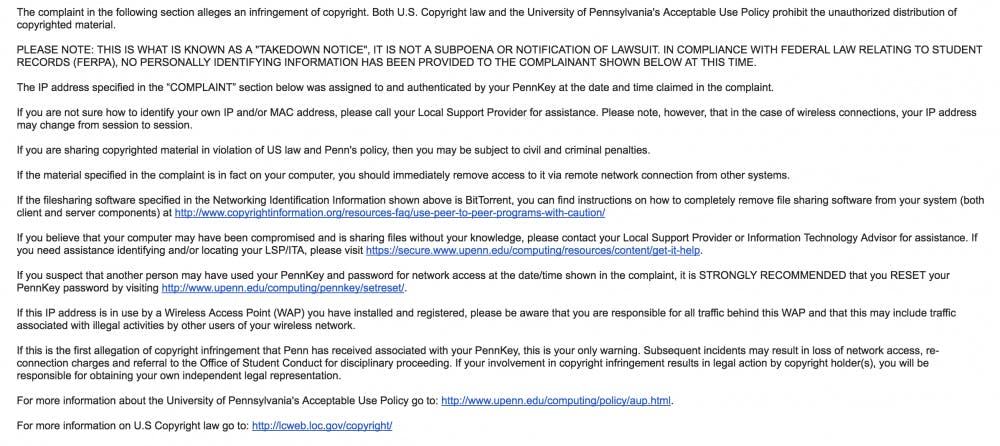
When students use Penn's wifi network, AirPennNet, they can get caught for not following copyright laws.
An Engineering sophomore, who has collected approximately 200 illegally download films on his computer, received a warning email from the University in March 2017 “on behalf of NBC Universal and its affiliates.” The email identified itself as a “takedown notice,” a term that comes from comes from The Digital Millennium Copyright Act of 1998.
It requested that he stop downloading or uploading NBC Universal property and that he delete any illicit NBC files he had, and said that if he was caught making a similar violation in the future, he may face "a loss of network access, re-connection charges and referral to the Office of Student Conduct for disciplinary proceeding."

However, eight months after he received the "takedown notice," the Engineering sophomore said that he has not changed his behaviors or received more notifications.
“I just figured no one really does anything about it,” he said. “It seems [the University is] sending out those notices because they have to, not because they intend on pursuing anyone.”
As more users switch to downloading and consuming content online, various students have run up against the law for violating copyright laws while on their university wifi networks. In May this year, a student from Bristol University was banned from her University's wifi network for downloading an illegal version of the film "Chicken Run."
Students using AirPennNet, which can have as many as 32,000 wireless devices connected simultaneously, must follow Penn’s policy on the Acceptable Use of Electronic Resources, said Penn’s Information Systems and Computing Department’s leadership team in a statement.
“The policy is based on the principle that the electronic information environment is provided to support University business and its mission of education, research and service,” the policy reads. "Other uses are secondary.”
Penn has sent multiple emails to the University community informing students and faculty of copyright policies. According to the most recent email sent on Oct. 17, the Higher Education Opportunity Act of 2008 requires colleges to actively combat the unauthorized distribution of copyrighted material by users of their network.
The ISC said Penn polices its network to ensure user safety and data security, but typically asks for any information that they need from users "whenever possible."
However, this is not how Penn typically receives information on Penn users violating intellectual property laws. This information usually comes from the “copyright holders” themselves, ISC said. Upon receiving this information, ISC relays the necessary takedown notices and complies with appropriate legal proceedings.
Associate Dean at Penn Law School and law professor R. Polk Wagner said punishments for copyright violations are generally light unless a student is “running a major bit torrent site out of [their] dorm room.”
ISC added that it is only when students receive multiple takedown notices that they are sent to the Office of Student Conduct, which reviews the University’s copyright policy with the student and the circumstances surrounding their offenses. Subsequently, the student could face education, fines, and discipline, as well as a loss of network access.
Penn’s policy on the Unauthorized Copying of Copyrighted Media also states that students could face monetary penalties for serious violations: $750 to $30,000 per work stolen, or up to $150,000 for “willful” infringement.
Wagner added that if Penn does not take appropriate strides to stop students violating copyright law, then it could face trouble.
“If the student is then doing it again and and again, then I think at some point the credibility [of] Penn’s efforts to clean up its own network becomes an issue and Penn could be held liable,” he said. “Penn has to be strict enough in order to have a real system that tries to prevent piracy."
The Daily Pennsylvanian is an independent, student-run newspaper. Please consider making a donation to support the coverage that shapes the University. Your generosity ensures a future of strong journalism at Penn.
Donate




